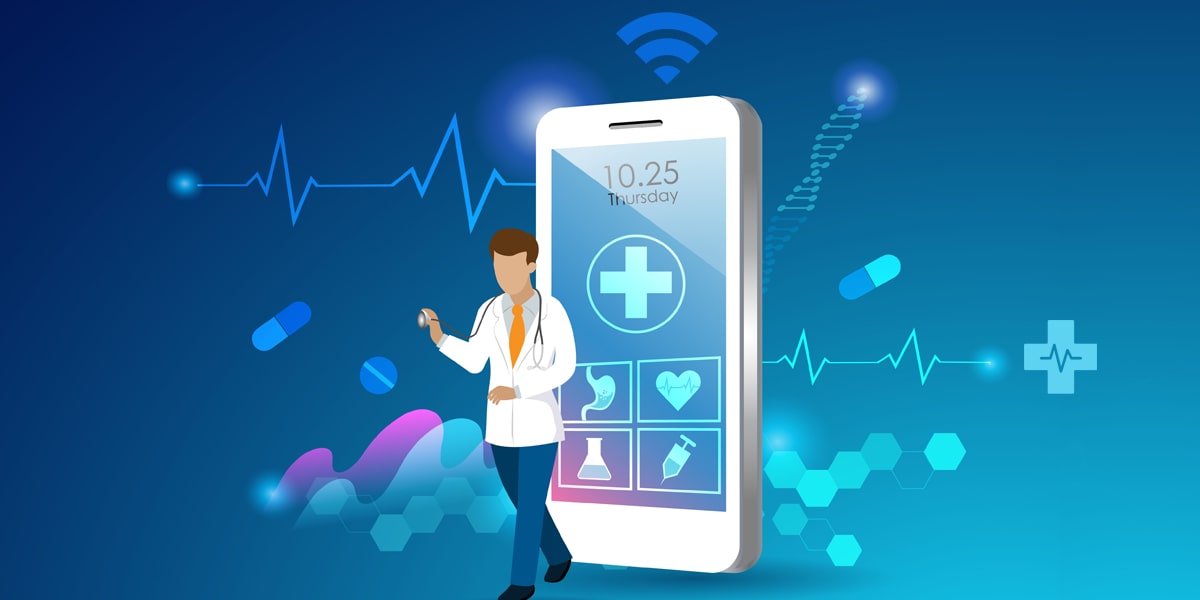In recent years, technology has dominated the world. The technology brings revolution in advancements that lead major innovation across every Industry. The healthcare industry has witnessed a significant transformation with the emergence of health apps. These mobile applications have revolutionized the way people manage their health and interact with healthcare providers.
With just a few taps on their smartphones, individuals can now access a wealth of health-related information, monitor their vital signs, and even consult with medical professionals remotely. This article delves into the impact of health apps on the healthcare industry and explores the future of mobile health.
What is Medical Health?
Rise of Healthcare Apps
According to Statista, the mobile health market or mHealth app is expected to grow in the upcoming years and is forecasted to increase 300 billion U.S. dollars by 2025.
According to the mobile market data provider report, the global health, App Annie and fitness app market generated over $4 billion in revenue in 2020. This figure is expected to continue increasing by an estimated $14.6 billion by 2026.
The report also highlights that the number of health app downloads increased significantly during the COVID-19 pandemic, as people sought alternative ways to maintain their health and fitness routines while adhering to social distancing measures.
Different Types of Healthcare Apps
There are several types of healthcare apps are there.
- Fitness and Wellness Apps
- Diet and Nutrition Apps
- Medication Management Apps
- Chronic Disease Management Apps
- Mental Health Apps
- Women’s Health Apps
- Telemedicine Apps
- Remote Monitoring Apps
- Medical Reference Apps
- Health Tracking Apps
- Emergency Response Apps
- Health Education Apps
- Pharmacy and Prescription Apps
- Wearable Device Integration Apps
Benefits of Healthcare Apps for Patients
1. Convenient Access
On-demand healthcare apps provide patients with instant access to healthcare services anytime, anywhere. Patients can schedule appointments, consult with doctors, and even order medication from the comfort of their own homes. This convenience is especially beneficial for individuals with limited mobility, busy schedules, or those living in remote areas.
2. Time and Cost Savings
By using on-demand healthcare apps, patients can save valuable time and reduce healthcare costs. They can avoid long waiting times at clinics and hospitals, as well as eliminate the need for traveling to healthcare facilities. This can be particularly helpful for non-emergency consultations, follow-up appointments, or minor health concerns that can be addressed remotely.
3. 24/7 Availability
On-demand healthcare apps provide round-the-clock access to healthcare professionals. Patients can seek medical advice or assistance at any time, including outside regular office hours or during emergencies. This availability ensures that patients receive prompt attention and care, leading to better health outcomes.
4. Increased Medical Accessibility
On-demand healthcare apps break down barriers to accessing medical expertise. Patients in remote or underserved areas can connect with healthcare professionals from anywhere in the world. This facilitates access to specialized care, second opinions, or consultations with renowned doctors who may be located far away.
5. Enhanced Communication and Follow-up
These apps promote efficient communication between patients and healthcare providers. Patients can securely share medical records, test results, and images with doctors for accurate diagnosis and treatment planning. Additionally, follow-up appointments and medication reminders can be scheduled, ensuring continuity of care and improved patient outcomes.
6. Personalized Health Monitoring
Some on-demand healthcare apps offer features for personalized health monitoring. Patients can track their vital signs, symptoms, or medication adherence using wearable devices or integrated sensors. This real-time data enables healthcare providers to monitor patients remotely and make timely interventions, leading to proactive and personalized healthcare.
7. Health Education and Awareness
On-demand healthcare apps often provide reliable health information, resources, and educational materials. Patients can access articles, videos, or FAQs to enhance their health knowledge and make informed decisions. This empowers individuals to actively participate in managing their health and encourages preventive care practices.
8. Privacy and Security
Reputable on-demand healthcare apps prioritize patient privacy and data security. They adhere to strict regulations and employ robust encryption methods to safeguard personal health information. Patients can have peace of mind knowing that their confidential data is protected.
The Future of Mobile Health
As technology continues to advance, the future of mobile health looks promising. Innovations such as artificial intelligence, wearable devices, and integration with other smart technologies hold immense potential for further transforming healthcare. For example, AI-powered health apps can analyze vast amounts of data to provide accurate health predictions and personalized recommendations. Wearable devices can seamlessly track various health parameters and transmit real-time information to healthcare providers. Integration with smart home devices can create a connected ecosystem that promotes holistic health management.
Build Your Own On-Demand Healthcare App With Authorselvi
We are a trusted mobile & web app development company, building apps across various industries including Healthcare. With 13+ years of experience, our team of skilled developers specializes in on-demand solutions and stays updated with the latest technologies.
mHealth apps developed by Authorselvi have significantly increased the ROI as per your business needs. If you are seeking a top-tier app development company to create a customized mobile health app for your hospital or healthcare business, reach out to us without delay. Our experts will respond to you within 24 hours.
